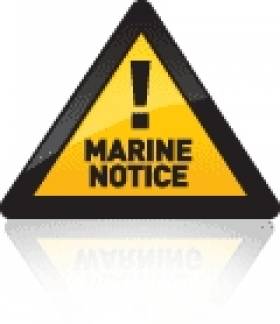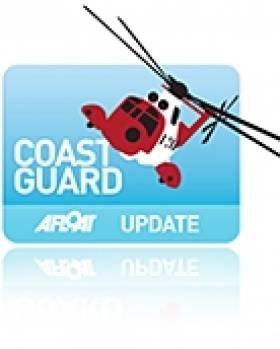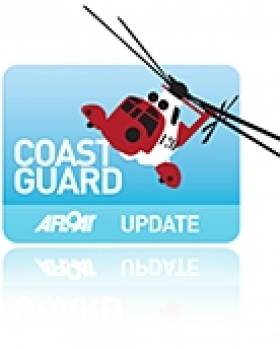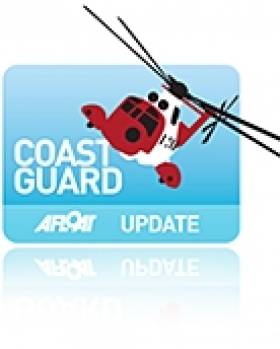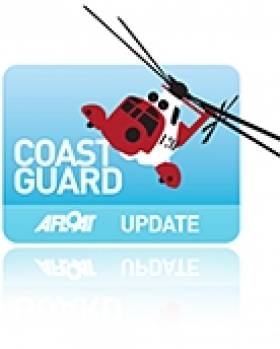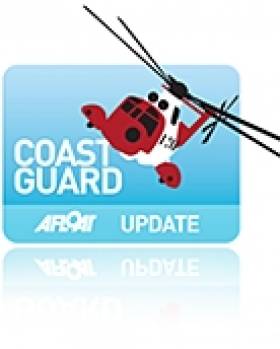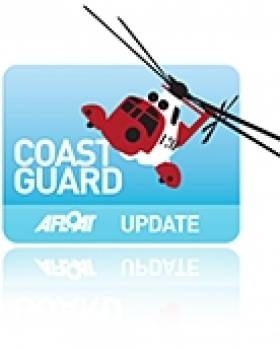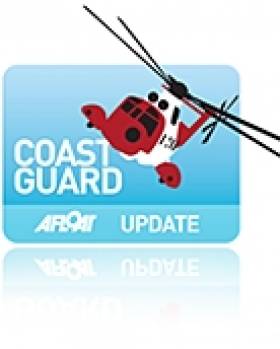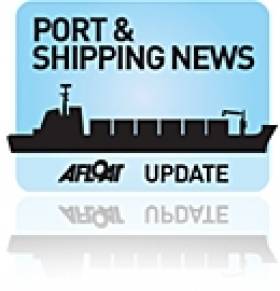Displaying items by tag: Coast Guard
Coast Guard Appeal to Exercise Caution During 'Red Alert' Severe Weather
#storm – Members of the public have been urged to exercise extreme caution on exposed coastal areas this afternoon as Met Éireann issues an red alert.
Met Éireann has a red weather alert in force. Coastal areas will experience winds increasing from storm force 10 to violent storm with some severe gusts this afternoon.
The Coast Guard particularly appeal to people to use common sense and not to place themselves in danger.
The Coast Guard strongly advises the public to stay away from exposed piers, cliff walks, harbour walls, beaches, promenades or any other coastal areas during the stormy weather.
Remember to monitor weather broadcasts when travelling and heed the advice of the RSA on road use during severe weather and high winds.
Specific advice from the Coast Guard is:
• The public is advised to stay away from the shoreline and to avoid engaging in water sports
• Do not venture out unnecessarily when gale force conditions are forecast
• Avoid exposed coasts, cliff paths and coastal areas during inclement weather
• Owners of small vessels and fishing vessels in coastal waters should seek shelter and secure them properly with moorings.
If you do see someone in difficulty in the sea, on the shore, cliffs, lakes or rivers dial 999 or 112 and ask for the Coast Guard.
Joint Garda Síochána & Coast Guard Appeal for Caution During weekend Stormy Weather
#orangealert – Members of the public have been urged to heed the advice of An Garda Síochána and the Coast Guard as Met Éireann issues an orange alert for Gale warning and a yellow alert for risk of localised flooding.
An Garda Síochána and Coast Guard particularly appeal to parents/guardians with children to use common sense and not to place their loved ones in danger.
Exercise great care on exposed piers, cliff walks and waterways prone to flooding and swift flowing water during the stormy weather over the coming weekend and next week.
Superintendent David Taylor, Garda Press Officer, said: "People need to recognise the destructive and dangerous power of nature and exercise extreme caution when close to areas such as cliff walks, harbours, rivers and lakes."
Coast Guard Chief of Operations Eugene Clonan said: "It is important for parents to be especially vigilant over the next few days and use common sense when taking children out near the coast or inland water ways".
Passengers Rescued After Wave Hits Bus in Pembrokeshire
#coast guard – Ten people have been rescued after the bus they were travelling on was hit by a large wave in Newgale in Wales.
Milford Haven Coastguard was contacted just after 7pm this evening with reports that the bus was stuck on the seafront, having been hit by a large wave and was surrounded by water. The wind at the time was gusting over 50mph.
Broadhaven and St. Davids Coastguard Rescue Teams, HM Coastguard’s Sector Manager for Preseli, along with police, fire and ambulance crews were sent to the scene. The RAF search and rescue helicopter from RMB Chivenor was also asked to assist, but was stood down once the passengers were helped to safety by rescue units on scene. There are no reported injuries.
Steve Matthews, Watch Manager at Swansea Coastguard, said:
"There are tricky conditions on the sea and along the coast tonight, with gale force winds, high tides and heavy rain.
"Our advice is simple, please don’t take risks. But if you do get into difficulty, or spot someone who might be in trouble, call 999 and ask for the Coastguard.”
Coast Guard Warning as Met Éireann Issues Orange Weather Alert
#weatherwarning – Southerly gales will develop overnight on all Irish coastal waters and on the Irish sea, gradually veering southwest to west later tonight and tomorrow and increasing gale to storm force. Frequent heavy showers, some thundery with sleet and snow for a time mainly on higher ground.
High coastal flood risk, due to the combination of very high spring tides, extremely high waves (greater than 10 m).
The Coast Guard strongly advises the public not to go out on exposed coasts, cliffs, piers, harbour walls, beaches, promenades or any other coastal areas during the inclement weather. Huge waves can be whipped up by high seas. These waves can pose hazards to anyone close to the shoreline.
Manager of the Irish Coast Guard, Declan Geoghegan said: " Extreme care should be taken in exposed areas especially cliffs, promenades, slipways and all beach areas also photography in these weather conditions has become popular and people should not put themselves at risk for such activities or indeed any water related leisure activities"
Remember to monitor weather broadcasts when travelling and heed the advice of the RSA on road use during severe weather and high winds.
Specific advice from the Coast Guard is:
• The public is advised to stay away from the shoreline and to avoid engaging in water sports
• Do not venture out unnecessarily when gale force conditions are forecast
• Avoid exposed coasts, cliff paths and coastal areas during inclement weather this week
• Owners of small vessels and fishing vessels in coastal waters should seek shelter and secure them properly with moorings.
If you do see someone in difficulty in the sea, on the shore, cliffs, lakes or rivers dial 999 or 112 and ask for the Coast Guard.
Coast Guard Issues Warning as Met Éireann Issues Orange Weather Alert
#coastguard – Members of the public have been urged to heed the advice of the Irish Coast Guard as Met Éireann has issued an orange weather warning for counties Donegal, Galway, Leitrim, Mayo, Sligo, Clare, Kerry and Limerick.
An orange weather warning is forecast in west and south west coastal counties with some extremely windy, blustery conditions at times during the rest of this weekend, with winds gusting between 100 and 130 km/h at times - highest in coastal areas. The wind direction will be mainly southwest to westerly, but will be southerly for a time later tonight. An additional hazard will be high seas and waves, which will be highest during Sunday afternoon and Sunday night.
Severe southwest winds with mean speeds of 70 to 90km/h and damaging gusts of 120 to 150km/h, strongest in exposed coastal areas. Very high seas also being predicted.
The Coast Guard strongly advises the public not to go out on exposed coasts, cliffs, piers, harbour walls, beaches, promenades or any other coastal areas during the inclement weather. Huge waves can be whipped up by high seas. These waves can pose hazards to anyone close to the shoreline.
Manager of the Irish Coast Guard, Declan Geoghegan said: "The public should be extremely careful when venturing out in such conditions, they should check the weather forecast and remain away from exposed areas."
Remember to monitor weather broadcasts when travelling and heed the advice of the RSA on road use during severe weather and high winds.
Specific advice from the Coast Guard is:
• The public is advised to stay away from the shoreline and to avoid engaging in water sports
• Do not venture out unnecessarily when gale force conditions are forecast
• Avoid exposed coasts, cliff paths and coastal areas during inclement weather this week
• Owners of small vessels and fishing vessels in coastal waters should seek shelter and secure them properly with moorings.
If you do see someone in difficulty in the sea, on the shore, cliffs, lakes or rivers dial 999 or 112 and ask for the Coast Guard.
S92 Search & Rescue Helicopter Launched in Dublin
#coastguard – Minister for Transport, Tourism & Sport Leo Varadkar officially launched the Coast Guard's new state-of-the-art S92 search & rescue helicopter for the Dublin region in Weston Airport today.
This is the fourth and final Sikorsky S92 helicopters to come into operation for the Coast Guard and means the entire fleet has now been upgraded. It replaces the Sikorsky S61 which was in use until recently at Coast Guard bases in Dublin, Shannon, Sligo and Waterford.
Speaking at the launch Minister Varadkar said: "This new helicopter means the Irish Coast Guard now has one of the most modern and effective helicopter fleets in the world. The S92 is tailored specially for search & rescue operations. It has an extended range of 270 nautical miles, is faster and safer, can carry more casualties, and can fly at higher altitude and in much worse weather.
"I'm delighted that the entire Coast Guard helicopter fleet has now been upgraded. It comes after one of the busiest years ever for the Coast Guard which responded to 2,627 incidents involving fishing craft, leisure vessels and mountaineers. A well-equipped and well-resourced Coast Guard can represent the difference between life and death for anyone in trouble at sea or on land.
"The new helicopters also allowed the Coast Guard to expand its role in providing emergency medical transport for the HSE. Last year the Coast Guard performed 253 aeromedical missions and 159 offshore island medical evacuations.
"This is a good occasion to pay tribute to the dedicated helicopter crews who work tirelessly to rescue lives all year round, and also the hundreds of volunteers on Coast Guard and RNLI vessels, mountain and cave rescue teams. It wouldn't be possible to provide the same level of emergency response without these volunteers. That's also why we have the highest ever allocation of €67.9 million for the Coast Guard in 2014 to finance the provision of critical search & rescue services."
Coast Guard Director Chris Reynolds said: "This has been an exceptional year in terms of the number of incidents, but there has been significant progress in terms of modernising and further developing the Coast Guard. The new helicopter fleet will greatly enhance our capacity to provide a first-class response to all emergencies in the year ahead, whether off-shore and inland."
The Coast Guard also announced a competition to name all four of the new helicopters. The nationwide competition will kick off next week and will be featured on Clare FM, Ocean FM, FM104, Q102 and WLR, including their Facebook sites. Listeners will be invited to send in their suggestions to these radio stations. The aim is to raise awareness locally of the new Coast Guard helicopters, and to inform people about how best to alert the Coast Guard or other emergency services in the event of an incident.
Enhanced medical capacity of Sikorsky S92
The S92 and its well-trained crews including State-registered paramedics can now provide a first class medical service in emergencies and for medical transfers.
Inter-hospital transfers, donor organ recipient transfers, specialist medical teams can now be transported in this modern, reliable and safe aircraft which with its large multi role cabin and rear access ramp which can accommodate stretchers, hospital trolleys, incubators, equipment and personnel .
It can also transfer specialised Ambulance Response and Mountain Rescue teams to an incident anywhere in the country at very short notice, for example train or bus crash or RTA (road traffic accident) requiring multi casualty evacuation.
The Coast Guard has surveyed over 50 landing sites countrywide but has focused mainly on needs in areas where road transport may not benefit the patient if urgent transport was required, especially in terms of transferring people to a centre of excellence within the 90 minute window which is the requirement in the majority of cases when a casualty needs immediate medical attention at a nominated medical centre as directed by HSE staff.
The area of operation in the Irish EEZ (Economic Exclusion Zone) will also be expanded to nearly 300 miles offshore and using the S92's satellite communications, long-range and discreet communications suite, which means that casualty information can be transmitted to the receiving hospital.
Technical information on Sikorsky S92
The capability to be on-scene to a maritime incident in any weather conditions in a shorter time period is largely enhanced due in the main to four main attributes of the aircraft:
Speed: Up to 150kts and doesn't lose speed at altitude, will carry 22 casualties at max range with twin engines each delivering 2500 SHP.
Range: Will have an ROA of 270mls from Waterford and can enhance that with auxiliary tanks.
De-icing: In adverse weather where rotor icing is an issue this aircraft can fly at 10.00ft in conditions of minus 40dgs C.
Performance: Modern reliable engines which deliver more power coupled with three programme linked navigational software , searchlight capability of 30 million candle power , dual high speed winches, high resolution picture zoom, memory mapping, adjacent aircraft detection capability, hi-tech communication systems, large multi role cabin, HEMS licenced, 8 passenger seats, reliable single engine performance, enhanced hover performance and in-flight homing equipment.
The Department of Transport and Coast Guard are members of the Marine Safety Working Group which promotes the importance of water safety for professional and leisure users.
Initiatives launched in 2013 included:
• Slipway signage advising people to use a Personal Flotation Device (lifejacket).
• Launch of new safetyonthewater.ie website
• New Poster Campaign promoting the use of Personal Flotation Devices and communication/alerts devices.
• Promotion of Water Safety on RTE's Search & Rescue show and a new Coast Guard water safety advertisement for TV.
• Wristband IDs for children using the beach or other recreational facilities.
The Marine Safety Working Group comprises:
Irish Coast Guard (IRCG),
Irish Maritime Administration of the Department of Transport, Tourism & Sport,
Irish Water Safety,
Waterways Ireland,
Health and Safety Authority,
Royal Lifeboat Institution,
Bord Iascaigh Mhara
Met Eireann
Irish Sailing Association(ISA).
Canoeists Rescued After Lough Neagh Capsize
#canoe – Three canoeists have been pulled from the water after getting into difficulty in Lough Neagh.
Belfast Coastguard received a call on VHF channel 16 just after 1pm yesterday afternoon reporting that three canoeists had fallen into the water between Rams Island and Sandy Bay. Conditions on the water at the time were described as choppy, with a southerly wind of force 4 (13–17 mph).
The Kinnego Coastguard Rescue Team along with the Kinnego and Ardboe Independent Rescue Boats were sent to the scene. The three, who were all wearing lifejackets, were rescued from the water by a sand barge that was close by at the time. They were then transferred to the Ardboe rescue boat, and taken ashore where they were met by Coastguard Rescue Officers and passed into the care of the Northern Ireland Ambulance Service.
Liam Colquhoun, Watch Manager at Belfast Coastguard, said:
"These three canoeists all had lifejackets on, but unfortunately they weren't wearing wet suits or any type of gear that would help keep them warm. They were passed into the care of paramedics showing signs of hypothermia.
"We always recommend that canoeists and kayakers are well prepared before setting out. Check weather and tides, wear a buoyancy aid, suitable clothing and carry a VHF marine band radio with you. Where there is good network coverage then it is worth carrying a mobile phone in a waterproof bag.
"Call the Coastguard if you get into difficulty, preferably via channel 16 on your radio or if not by calling 999 on your mobile and asking for the Coastguard."
Minister for Transport, Tourism & Sport Leo Varadkar has published his priorities for 2014 with a number of marine targets on his list. Varadkar wants to transfer of some ports to local authority control, and in changes to the Merchant Shipping (Registration of Ships) Bill, there are proposals to introduce a level of boat registration for leisure craft.
After a busy year for the Coasty guard in 2013, the Minister has also said he wants to develop and implement a 'Safety at Sea' strategy to reduce the number of marine fatalities and casualties.
"This year my focus is on developing new projects across all three areas of Transport, Tourism & Sport, while consolidating progress already made. Priorities include starting work on the Gort-Tuam motorway, targets to increase the use of public transport, reducing road fatalities, and moving Luas Cross City in Dublin to full construction stage.
"In tourism, we will build on The Gathering and focus on increasing visitor numbers to Ireland by 4%, and tourism revenue by 8%. There will be a strong focus on sports tourism and outdoor tourism with the Giro d'Italia, Croke Park Classic and the Wild Atlantic Way. I will also publish new tourism and aviation policies.
"The foundations will be laid for our bid for the Rugby World Cup. Work will start on the National Indoor Arena at the National Sports Campus in Dublin, and we will publish a new Masterplan for Sport. Other key projects include finalising the merger of Shannon Airport with Shannon Development, and the NRA with the RPA. Most importantly, there will be a renewed focus on road safety, and we will also start testing new roadside drug testing equipment."
Priorities for 2014
Contribute fully to the Government's efforts to reduce the deficit, generate economic growth and increase employment;
Publish new Tourism and Aviation policies and begin work on a Masterplan for Sport;
Publish/Enact the following legislation:
Vehicle Immobilisation (Clamping) Bill,
State Airports (Shannon) Bill,
Roads Bill (NRA/RPA merger),
Sport Ireland Bill,
Harbours Amendment Bill (transfer of ports to local authority control),
Merchant Shipping (Registration of Ships) Bill.
Lay the foundations for a bid for the Rugby World Cup;
Develop and implement a 'Safety at Sea' strategy to reduce the number of marine fatalities and casualties;
Renew focus on Road Safety to reduce the number of deaths and serious injuries in 2014 including the enactment of the Road Traffic Bill and the introduction of equipment to enable roadside testing for drivers under the influence of drugs;
Increase the number of overseas visits to Ireland by 4% and revenue by 8%;
Commence works on the Luas Cross City Project and ensure that disruption in the City is well handled and minimised in so far as possible;
Construction to begin on Gort-Tuam Motorway and progress the next bundle of PPPs to tender (Wexford);
Work with NTA, CIE, Luas and other transport operators to increase the number of people using public transport by 2% ie 5 million passenger journeys;
Provide support for a number of flagship Greenways;
Review the National Cycle Policy Framework;
Develop and promote the Wild Atlantic Way at home and abroad;
Make new allocations for facilities and equipment under the Sports Capital Programme;
Develop facilities at the National Sports Campus including the commencement of work on the National Indoor Arena;
Finalise the implementation of the new Rural Transport Programme with the establishment of 18 Transport Coordination Units co-located with local authorities;
Commence the Taxi Regulation Act in conjunction with adoption of implementing regulations by NTA;
Implement the recommendations of the Speed Limits Review;
Launch an online facility for Road Haulage Operator Licence applications;
Develop a road charging scheme for HGVs;
Publish a Roadmap for the transition of transport to a low-carbon future and a Strategic Framework for Investment in Land Transport ensuring that priorities for future capital investment are evidence-based;
Provide City Bikes in Cork, Limerick and Galway;
Extend the LEAP card to Cork and Galway;
Map the future development of Rosslare Port.
Tidal Surge Warning Issued By NI Coast Guard
#coastguard – Belfast Coastguard are issuing a warning following the Met Office forecast for rain during the remainder of Sunday and for strong winds or gales on Monday. The Northern Ireland and Scottish Coastline is expected to get hit with strong winds and high tides to produce large over-topping waves and another tidal surge, with the east coast particularly at risk.
Belfast Coastguard Rescue Co-ordination Centre manager, Steven Carson, said:
"With one of the worst tidal surges in recent years, we would urge members of the public to take extra care along our coastline at this time. Please stay away from coastal paths, sea walls and cliff edges. These types of conditions, with choppy seas and large waves, are likely to be with us for a few days yet, so please don't take risks. If you do get into difficulty, or spot someone else in trouble, call 999 straight away and ask for the Coastguard."
Port of Cork Tug to Rendezvous with Drifting Bulk Carrier off Kinsale
#shipdrifting – A bulk carrier ship registered in Bermuda is drifting off the Old Head of Kinsale in Co Cork in strong winds and big seas.
The 108-metre vessel, Abuk Lion, is en route from Aughinish in Co Clare to St Petersburg in Russia. She is fully laden with bauxite. The vessel raised the alarm at around 3pm after its main engine failed.
The Coast Guard has sent a tug from the Port of Cork to assist the Abuk Lion. The tug is expected to rendezvous with the vessel at around 3am.
RTE News reports the Coast Guard is monitoring the situation and the Coast Guard helicopter in Waterford remains on stand-by.
Conditions at sea are bad, with Force 8 winds and swells of up to six metres. There are 13 people on board the Abuk Lion. They are not believed to be in any danger at this stage


























